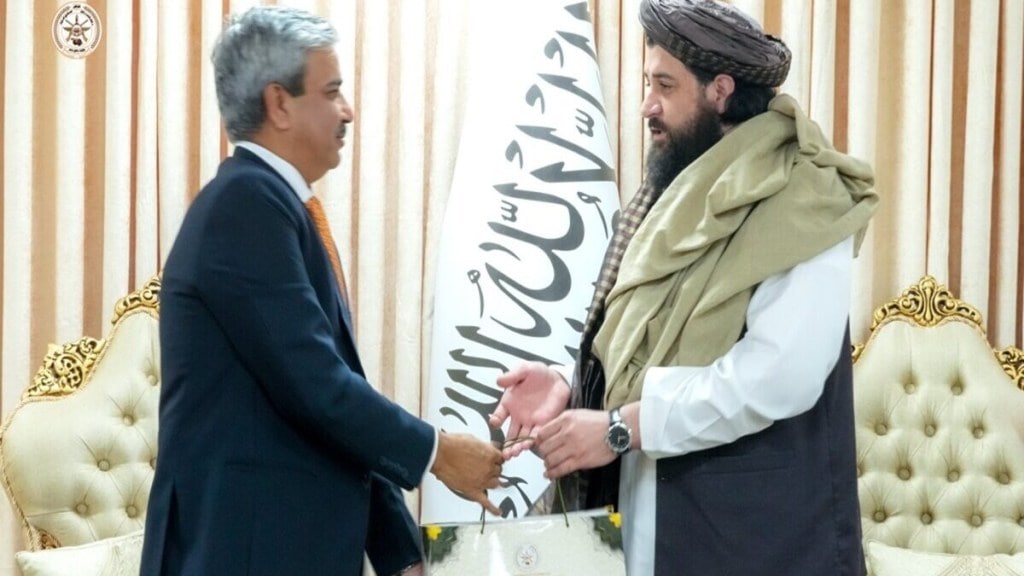In a significant step that has raised eyebrows across the region, India’s Joint Secretary in the Ministry of External Affairs, JP Singh, met with Mullah Yakub, the Taliban’s Defence Minister, in Kabul on November 4-5, marking the first official meeting between an Indian diplomat and the Taliban’s defence leadership. This interaction holds immense diplomatic weight, as it comes amidst shifting geopolitical alliances in South Asia, particularly with Pakistan’s growing unease over India’s engagement with both China and the Taliban.
Mullah Yakub, the son of the Taliban’s founder Mullah Omar, is widely regarded as a strong opponent of Pakistan. His recent statements have shown a clear desire to strengthen ties with India, especially in defence and humanitarian areas. This meeting is especially important as it underscores India’s growing diplomatic engagement with Afghanistan since the Taliban’s takeover in 2021.
A Diplomatic Surprise
The meeting between JP Singh and Mullah Yakub took many by surprise. It is part of a broader Indian effort to engage with Afghanistan after the Taliban’s rise to power. This was Singh’s second visit to Kabul this year, having previously visited in March, and represents one of several such visits by Indian officials since the Taliban’s return to power. The Indian delegation also held talks with Taliban’s acting Foreign Minister, Amir Khan Muttaqi, and former Afghan President Hamid Karzai.
The meeting was described by the Taliban’s National Security Ministry on social media, stating that both sides expressed a desire to expand bilateral relations, with a focus on humanitarian cooperation. The Taliban government reaffirmed its commitment to not allowing Afghan soil to be used for terrorist activities against India. This reassurance is key for India, as security concerns regarding cross-border terrorism from Afghanistan have long been a central issue.
Strengthening Ties Amidst Regional Shifts
India’s diplomatic overtures to the Taliban are taking place against a backdrop of deteriorating relations between Pakistan and Afghanistan. This new dynamic isolates Pakistan as India and Afghanistan explore deeper ties. Additionally, tensions between Pakistan and India remain high, with ongoing disputes over issues like Kashmir. Pakistan’s growing isolation, combined with the increasing violence against Chinese nationals in Pakistan, has led to frustration in Beijing. Reports suggest that China has sought Taliban assistance for the security of its citizens, further emphasizing the shifting alliances in the region.
India’s role in supporting Afghanistan’s stability, particularly through humanitarian aid, is another key aspect of the meeting. Responding to questions regarding the visit, official spokesperson of MEA Randhir Jaiswal stressed that the visit focused primarily on humanitarian assistance, with a special mention of India’s efforts to help Afghan citizens and businesses. According to Jasiswal, the Indian side also discussed ways in which Afghan traders can utilize Iran’s Chabahar Port for better economic linkages, a project in which India has a significant stake.
Taliban’s Diplomatic Push and India’s Response
The Taliban’s government has sought recognition from the international community since it took control of Afghanistan. Despite some countries, such as China and the UAE, recognizing the Taliban’s appointed ambassador, India has refrained from doing so, maintaining its position of non-recognition. India’s embassy in Kabul has been closed since 2021, though a technical team continues to operate in Afghanistan. The Taliban hopes to sway India’s stance, but for now, the diplomatic exchanges remain focused on practical cooperation rather than formal recognition.
India’s cautious approach contrasts with the growing diplomatic presence of other nations in Afghanistan. The recognition of Taliban representatives in some countries, including China, has increased pressure on India to reconsider its stance, especially as regional dynamics evolve.
Strategic Implications for India and the Region
The meeting between JP Singh and Mullah Yakub is strategically significant. With tensions between Pakistan and Afghanistan escalating, and Pakistan’s strained relations with both India and China, India’s engagement with the Taliban signals a potential realignment in South Asian geopolitics. Furthermore, the Taliban’s assurance that Afghan soil will not be used for anti-India activities is crucial for India’s security concerns.
The broader implications of this meeting are also worth noting in the context of Afghanistan’s relations with China. Beijing has been frustrated by attacks on its citizens in Pakistan and has reportedly turned to the Taliban for assistance in safeguarding its interests in the region. This development shows the increasing complexity of alliances in South Asia, with India cautiously navigating its interests while maintaining a humanitarian focus in Afghanistan.
While the relationship remains complicated and fraught with challenges, the discussions between JP Singh and Mullah Yakub highlight India’s continued interest in ensuring stability in Afghanistan, particularly through humanitarian assistance and regional cooperation. As India explores deeper engagement with Afghanistan, the implications for regional security and diplomacy remain significant, with Pakistan’s growing isolation in the process.

